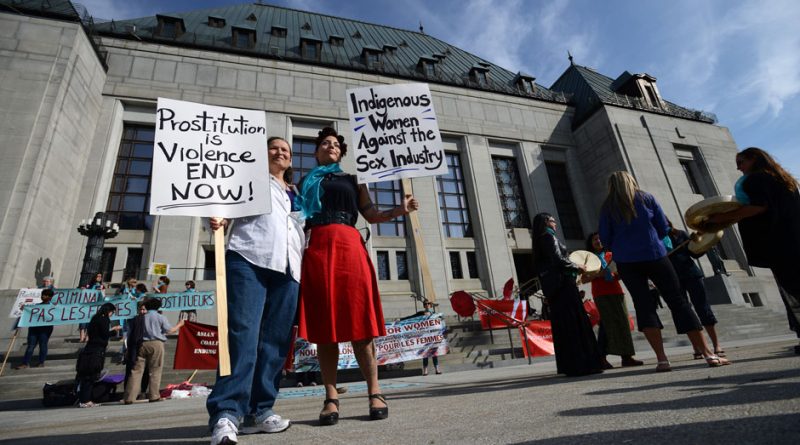Prostitution Laws in Canada
Laws restricting prostitution are being challenged by sex workers, associates, and buyers.
Key Actors:
- Tiffany Harvey; former Fantasy World Escorts owner
- Hamad Anwar; former Fantasy World Escorts owner
Bill C-36:
In 2014, Canada’s federal government passed Bill C-36 in an attempt to reduce prostitution. The Bill mainly goes after the buyers rather than the workers in the industry. Punishments of buying sex include up to five years of jail time and cash fines. Similarly, the individuals who work with the sex workers are also being held accountable in this trade and can receive up to ten years of jail time for receiving “a financial or other material benefit, knowing that it is obtained by or derived directly [from]… sexual service.”
While the penalty for sex workers is less severe than those working with them or the buyers, there are still some restrictions that they face with the bill. The most detrimental of the rules would be that sex workers (1) cannot receive material benefit from the sale unless it is by themselves, and (2)are prohibited from advertising their services for consideration or money. All three parties involved in this trade are to some extent negatively impacted, as seen by the objection in the following years.
Challenges against the Bill: (two paragraphs from both sides)
Recently there has been a legal argument against the prostitution charter and the case has been taken to court. In the coming weeks, the judge of the case will decide whether the prostitution laws violate the Charter of Rights and Freedoms or if it is for the greater good of Canada. This court case stems from a controversial incident from 2015 when Tiffany Harvey and Hamad Anwar, owners of the escort agency Fantasy World Escorts, were charged with over two dozen violations of Bill C-36. The court case challenging the bill has been ongoing up until recently. A conclusion will be reached by the end of June 2019.
Bill C-36 opposition comes from many fronts, including feminists, sex workers themselves, and others. For sex workers and those involved in the industry, the bill is viewed as an interference and safety issue. Since the bill prohibits the buying and advertising of the trade, those actions must be done discreetly, which is more dangerous for the sex worker and others involved. Furthermore, some view the profession as an acceptable measure of their own decision. In court, Chris Atchison testified against the law with arguments that sex workers are not victims; rather, they only become sex workers due to desire or necessity for money. He argues that the new bill is antagonizing the sex industry when, in reality, it is the livelihood of many workers and functions fine without government intervention.
On the other hand, the government argues that the purpose of Bill C-36 isto protect victims who are forced into the trade: “Prostitution is male violence against women, which is a serious barrier to gender equality and is incompatible with the internationally-accepted principles of human rights,” says Megan Walker, an individual in favour of the laws. In addition, Michael Carnegie, an individual arguing for the law, voiced that “the victims of prostitution are not just sellers but also children exposed to prostitution. Society itself is harmed by the commodification of sexual services.”
Outlook
Currently, it is difficult to gauge which side will win, and whether Bill C-36 will be kept or removed. However, both sides present strong arguments and, should Bill C-36 be kept, similar challenges will no doubt persist.
Bibliography
“Canada’s New Prostitution Laws: Everything You Need to Know.” The Globe and Mail, 25 June 2018, www.theglobeandmail.com/news/politics/canadas-new-prostitution-laws-everything-you-need-to-know/article19610318/.
“Lawyers Argue Canada’s Prostitution Laws Violate Sex Workers’ Charter Rights | CBC News.” CBCnews, CBC/Radio Canada, 23 Apr. 2019, www.cbc.ca/news/canada/london/london-ontario-charter-challenge-prostitution-laws-c-36-1.5103551.
“London, Ont. Court Case to Challenge Canada’s Prostitution Laws | CBC News.” CBCnews, CBC/Radio Canada, 7 Feb. 2018, www.cbc.ca/news/canada/london/london-ontario-bill-c-36-prostitution-laws-1.4520736.
“Selling Sex Is ‘a Societal Blight,’ Crown Argues in Prostitution Charter Challenge | CBC News.” CBCnews, CBC/Radio Canada, 13 June 2019, www.cbc.ca/news/canada/london/sex-trade-charter-challenge-london-ontario-fantasy-world-escorts-1.5172469.
“Vancouver Sex Workers Will Gather in West End for Annual Red Umbrella March.” Georgia Straight Vancouver’s News & Entertainment Weekly, 6 June 2019, www.straight.com/life/1250496/vancouver-sex-workers-will-gather-west-end-annual-red-umbrella-march.

